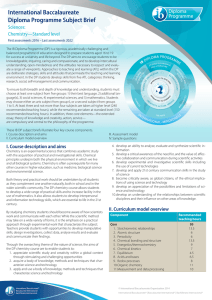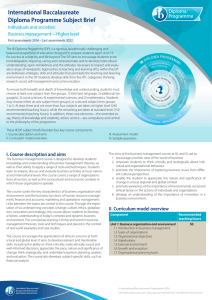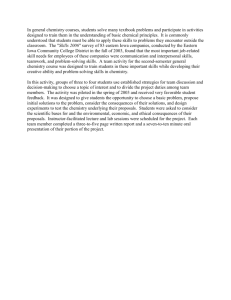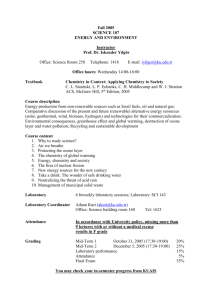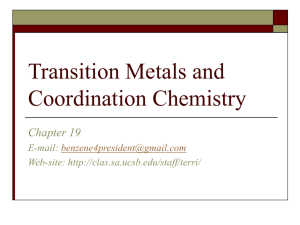Chemistry HL - International Baccalaureate
advertisement
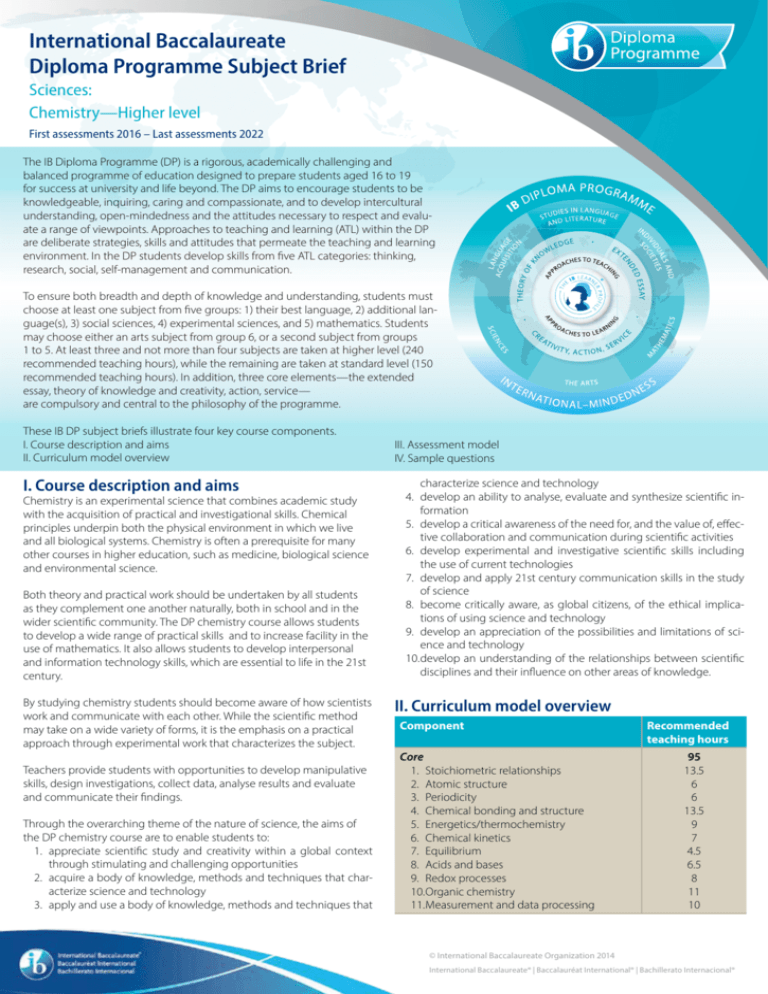
International Baccalaureate Diploma Programme Subject Brief Sciences: Chemistry—Higher level First assessments 2016 – Last assessments 2022 The IB Diploma Programme (DP) is a rigorous, academically challenging and balanced programme of education designed to prepare students aged 16 to 19 for success at university and life beyond. The DP aims to encourage students to be knowledgeable, inquiring, caring and compassionate, and to develop intercultural understanding, open-mindedness and the attitudes necessary to respect and evaluate a range of viewpoints. Approaches to teaching and learning (ATL) within the DP are deliberate strategies, skills and attitudes that permeate the teaching and learning environment. In the DP students develop skills from five ATL categories: thinking, research, social, self-management and communication. To ensure both breadth and depth of knowledge and understanding, students must choose at least one subject from five groups: 1) their best language, 2) additional language(s), 3) social sciences, 4) experimental sciences, and 5) mathematics. Students may choose either an arts subject from group 6, or a second subject from groups 1 to 5. At least three and not more than four subjects are taken at higher level (240 recommended teaching hours), while the remaining are taken at standard level (150 recommended teaching hours). In addition, three core elements—the extended essay, theory of knowledge and creativity, action, service— are compulsory and central to the philosophy of the programme. These IB DP subject briefs illustrate four key course components. I. Course description and aims II. Curriculum model overview I. Course description and aims Chemistry is an experimental science that combines academic study with the acquisition of practical and investigational skills. Chemical principles underpin both the physical environment in which we live and all biological systems. Chemistry is often a prerequisite for many other courses in higher education, such as medicine, biological science and environmental science. Both theory and practical work should be undertaken by all students as they complement one another naturally, both in school and in the wider scientific community. The DP chemistry course allows students to develop a wide range of practical skills and to increase facility in the use of mathematics. It also allows students to develop interpersonal and information technology skills, which are essential to life in the 21st century. By studying chemistry students should become aware of how scientists work and communicate with each other. While the scientific method may take on a wide variety of forms, it is the emphasis on a practical approach through experimental work that characterizes the subject. Teachers provide students with opportunities to develop manipulative skills, design investigations, collect data, analyse results and evaluate and communicate their findings. Through the overarching theme of the nature of science, the aims of the DP chemistry course are to enable students to: 1. appreciate scientific study and creativity within a global context through stimulating and challenging opportunities 2. acquire a body of knowledge, methods and techniques that characterize science and technology 3. apply and use a body of knowledge, methods and techniques that III. Assessment model IV. Sample questions characterize science and technology 4. develop an ability to analyse, evaluate and synthesize scientific information 5. develop a critical awareness of the need for, and the value of, effective collaboration and communication during scientific activities 6. develop experimental and investigative scientific skills including the use of current technologies 7. develop and apply 21st century communication skills in the study of science 8. become critically aware, as global citizens, of the ethical implications of using science and technology 9. develop an appreciation of the possibilities and limitations of science and technology 10.develop an understanding of the relationships between scientific disciplines and their influence on other areas of knowledge. II. Curriculum model overview Component Core 1. Stoichiometric relationships 2. Atomic structure 3.Periodicity 4. Chemical bonding and structure 5.Energetics/thermochemistry 6. Chemical kinetics 7.Equilibrium 8. Acids and bases 9. Redox processes 10.Organic chemistry 11.Measurement and data processing Recommended teaching hours 95 13.5 6 6 13.5 9 7 4.5 6.5 8 11 10 © International Baccalaureate Organization 2014 International Baccalaureate® | Baccalauréat International® | Bachillerato Internacional® Additional higher level (AHL) 12.Atomic structure 13.The periodic table—the transition metals 14.Chemical bonding and structure 15.Energetics/thermochemistry 16.Chemical kinetics 17.Equilibrium 18.Acids and bases 19.Redox processes 20.Organic chemistry 21.Measurement and analysis 60 2 4 7 7 6 4 10 6 12 2 Option (Choice of one out of four) A. Materials B. Biochemistry C. Energy D. Medicinal chemistry 25 25 25 25 25 Practical scheme of work Prescribed and other practical activities Individual investigation (internally assessed) Group 4 project 60 40 10 10 The group 4 project The group 4 project is a collaborative activity where students from different group 4 subjects, within or between schools, work together. It allows for concepts and perceptions from across disciplines to be shared while appreciating the environmental, social and ethical implications of science and technology. It can be practically or theoretically based and aims to develop an understanding of the relationships between scientific disciplines and their influence on other areas of knowledge. The emphasis is on interdisciplinary cooperation and the scientific processes. III. Assessment model Studying this course, students should be able to fulfill the following assessment objectives: 1. Demonstrate knowledge and understanding of: • facts, concepts, and terminology • methodologies and techniques • communicating scientific information. 2.Apply: • facts, concepts, and terminology • methodologies and techniques • methods of communicating scientific information. 3. Formulate, analyse and evaluate: • hypotheses, research questions and predictions • methodologies and techniques • primary and secondary data • scientific explanations. 4. Demonstrate the appropriate research, experimental, and personal skills necessary to carry out insightful and ethical investigations. Assessment at a glance Type of assessment Format of assessment External Time (hours) Weighting of final grade (%) 4.5 80 1 20 Paper 1 40 multiple-choice questions (Core and AHL) Paper 2 Short answer and extended response questions (Core and AHL) 2.25 36 Paper 3 Data- and practical –based questions, plus short answer and extended response questions on the option 1.25 24 10 20 10 20 Internal Individual investigation Investigation and write-up of 6 to 12 pages IV. Sample questions • What is the sum of the coefficients when the equation for the combustion of ammonia is balanced using the smallest possible whole numbers? ___ NH3 (g) + ___ O2 (g) A. 6 B. 12 C. 14 D. 15 (Paper 1) ___ N2 (g) + ___ H2O (g) • The two isomers of [Pt(NH3)2Cl2] are crystalline. One of the isomers is widely used in the treatment of cancer. i. Draw both isomers of the complex, ii. Explain the polarity of each isomer using a diagram of each isomer to support your answer, iii. State a suitable method (other than looking at dipole moments) to distinguish between the two isomers iv. Compare and contrast the bonding types formed by nitrogen in [Pt(NH3)2Cl2] (Paper 2) About the IB: For over 40 years the IB has built a reputation for high-quality, challenging programmes of education that develop internationally minded young people who are well prepared for the challenges of life in the 21st century and able to contribute to creating a better, more peaceful world. For further information on the IB Diploma Programme, and a complete list of DP subject briefs, visit: http://www.ibo.org/diploma/. Complete subject guides can be accessed through the IB online curriculum centre (OCC) or purchased through the IB store: http://store.ibo.org. For more on how the DP prepares students for success at university, visit: www.ibo.org/recognition or email: recognition@ibo.org.
